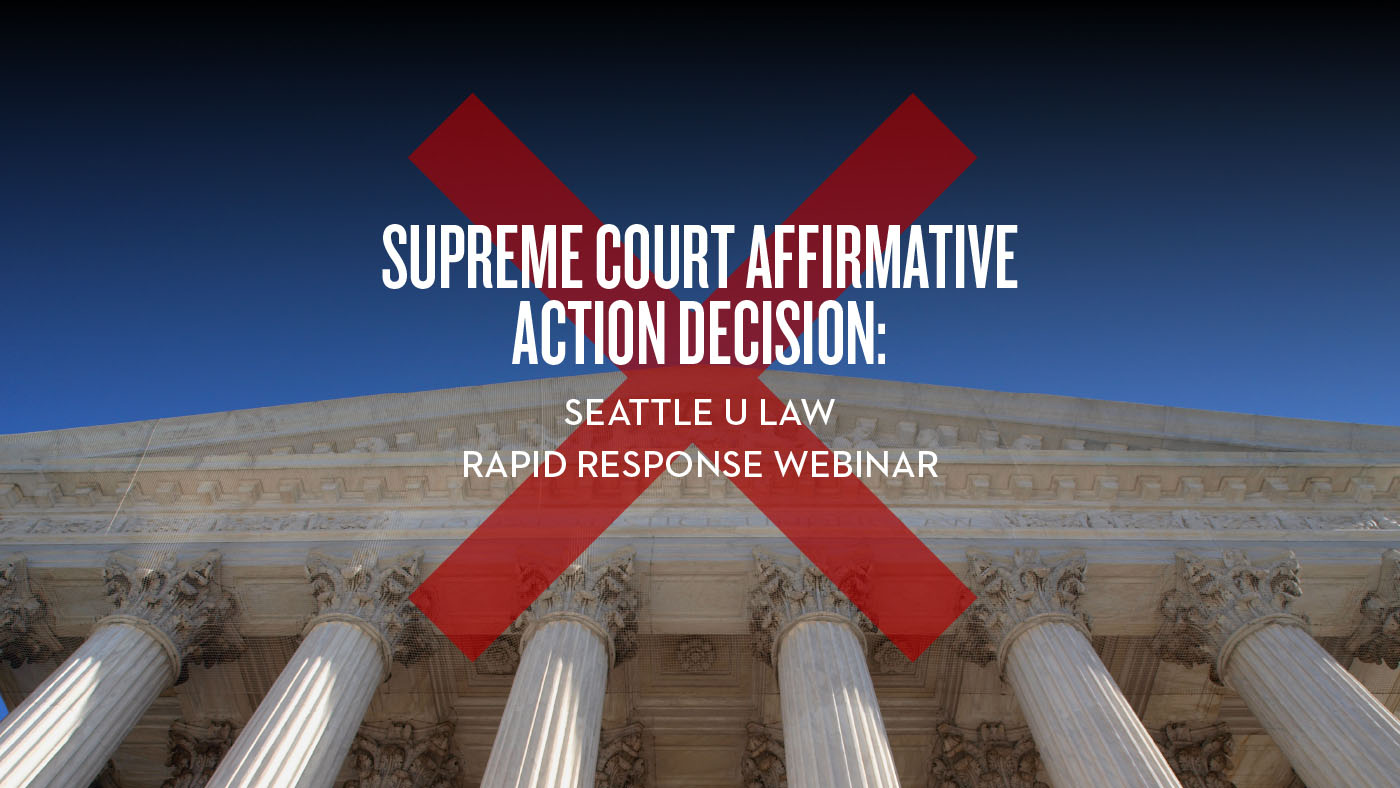A webinar hosted earlier this month by Seattle University School of Law attracted nearly 2,000 registered viewers, who listened to top experts from Seattle U Law and across the country analyze the U.S. Supreme Court’s decision on affirmative action, which ruled that race-conscious admissions in higher education is largely unconstitutional.
“The informative and illuminating program contributed greatly to our collective understanding of the impact of this decision on students from underrepresented communities and on institutions of higher education going forward,” said Dean Anthony E. Varona, who organized and introduced the online event. “Every speaker was brilliant, bringing to bear incisive analysis, nuance, and even hope.”
After an introduction from Varona, Seattle University President Eduardo Peñalver opened the program with a robust declaration that the university “will continue to use every tool consistent with the law and with our values to create a diverse and inclusive academic community. But discerning what is consistent with the law in light of yesterday’s decision, which unsettled decades of complex precedent, is no simple task, and helping us do that is one of the important goals of today’s program.”
His remarks complement a statement by the Association of Jesuit Colleges and Universities, of which Seattle University is a member, released shortly after the decision was announced:
“…we will honor our mission, guided by Catholic Social teaching and its vision of the common good, to continue our commitment to expanding the recruitment of Pell-eligible, first generation, and underrepresented students to our institutions.”
The webinar consisted of two roundtables.
The first, moderated by Deborah Ahrens, a professor of law and vice dean of intellectual life, considered the state and fate of affirmative action after the ruling, including an analysis of what the Supreme Court decided and why.
Speakers on the first roundtable included: Loyola University Chicago School of Law Dean Michèle Alexandre; Seattle U Law Professors Jeremiah Chin and Danieli Evans; American University Washington College of Law Professor Lia Epperson, who is also a former NAACP Legal Defense Fund education nondiscrimination litigator; and George Washington University School of Law Dean Dayna Matthew.
Matthew expressed her disappointment in the decision, a common sentiment among the speakers, but said this does not mean affirmative action is dead. Alexandre remarked on the jarring contrast of the dissents to the majority opinion, including one written by Justice Ketanji Brown Jackson, which argued that affirmative action policies are still necessary. “Great dissents make great future laws,” she said.
Epperson noted that the majority opinion does not deny that diversity is important, only that there is no way to measure how the goal of diversity is achieved.
Going forward, she said, we need to “really focus on moral and legal imperatives that colleges and universities have to ensure that pathways are open to all students, that students can still seek to share their whole experiences, including their racial experiences, and it is incumbent upon us at colleges and universities to be bold and aggressive about that.”
The second roundtable examined how higher educational institutions with diversity- and access-rooted missions should respond to the decision. Professor Steven Bender, associate dean for strategic initiatives, moderated the panel.
Speakers on the second roundtable included: Seattle U Professor Angelique Davis; Cornell Law School Professor Michael Dorf; University of New Mexico School of Law Professor Vinay Harpalani; Asian American Legal Defense and Education Fund Legal Director Bethany Li; University of Colorado Law School Professor Daria Roithmayr; Seattle U Law Professor Andrew Siegel; and University of North Carolina (UNC) Law Professor Erika K. Wilson, whose scholarship was cited by Justice Sonia Sotomayor in her dissent.
Wilson, whose university, UNC, was a defendant in one of two cases decided by the court, began by speaking about her experience as a law student at University of California Los Angeles after the state outlawed affirmative action in higher education. Out of 320 students, “there were only four Black students in my class,” she said.
Noting that the University of California system has been unsuccessful at achieving a diverse student body at its top tier campuses with colorblind admission processes, Wilson commented that the “general admissions system as it stands now has a number of inherent biases that likely cannot be overcome through race neutral mechanisms.”
Instead of focusing on racial diversity as the end goal, Wilson believes “the goal should be twofold: preventing the resegregation of higher education and remedying past discrimination.”
Ilya Somin, a law professor at George Mason University Antonin Scalia Law School, was unable to participate as planned due to a scheduling conflict. He penned a response to the decision that agreed with the majority opinion.
Seattle U Law has posted a full recording of the webinar on its YouTube channel.

